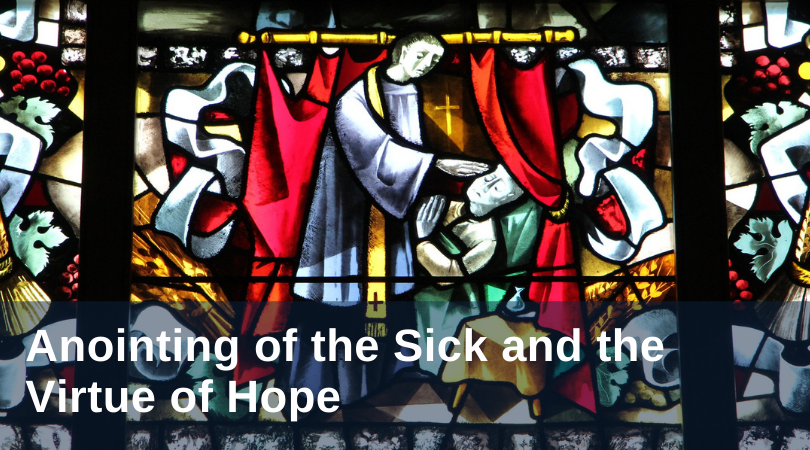
The woman before us was frail, lying peacefully, unalert—a shadow of the fierce, intelligent, vivacious woman she had been. Her 95 years on this earth had been lived to the fullest. The years had not been without their trials and sufferings, but they had always been lived for God. With God as her lifesource, Joan radiated light, joy, and love to all whom she encountered. The time had come for God to let his good and faithful servant go in peace.
On September 13, 2020, my family gathered around my Grandma Joan’s bedside, along with our pastor, Fr. Marc. We stood together to surround her in prayer, to bless her one last time, to witness the reception of her final sacrament—the Anointing of the Sick—so that we might commend her to “the suffering and glorified Lord, that he may raise [her] up and save [her]” (CCC, §1499). The sacrament ministered to her was also, in a sense, ministered to us, for in this communal celebration, we too were given comfort and filled with hope.
For many, the Sacrament of the Anointing of the Sick (once called ‘Extreme Unction’ and often thought of as ‘Last Rites’) is the least utilized and least understood of the seven sacraments. It is first and foremost a sacrament of healing, and therefore, can be received multiple times and at various stages in a person’s life. It is not only for those who are in danger of imminent death, but also for those whose sickness might lead to death, are of old age, or are about to undergo a serious operation (CCC, §1513–1515).
Healing, of both the body and the soul, was at the heart of Christ’s earthly ministry. Yet despite his countless miracles, Jesus did not physically heal every person suffering from illness and disease. How are we to make sense of this?
Through his life, Jesus transforms our understanding of suffering by taking on our infirmities. “On the Cross Christ took upon himself the whole weight of evil and took away the ‘sin of the world,’ of which illness is only a consequence. By his Passion and Death on the Cross Christ has given a new meaning to suffering: it can henceforth configure us to him and unite us with his redemptive Passion” (CCC, §1505).
Illness and suffering have, and always will be, a part of earthly existence; but death does not have the final say. By the power of the Cross, we have been given the promise of the Resurrection, the hope of new life. Christ’s healing ministry, therefore, does not end when he ascends to heaven, but it is carried on through the sacraments he entrusts to his Church. Christ wants to continue to heal and comfort us through the Anointing of the Sick. Sometimes this sacrament will result in miraculous healings; but even if there is no physical healing, there will always be a radical healing which the eye cannot yet see—that of the soul. This is the primary effect of the sacrament—that the individual be united to the Passion of Christ; have the strength, peace, and courage to endure his or her suffering in a Christ-like manner; be freed from sin; and be prepared to pass into eternal life (CCC, §1532).
And so, the individual receiving the Sacrament of the Anointing of the Sick is called to exhibit the virtue of hope, “the theological virtue by which we desire the kingdom of heaven and eternal life as our happiness, placing our trust in Christ's promises and relying not on our own strength, but on the help of the grace of the Holy Spirit” (CCC, §1817). This virtue is nourished through prayer and the graces of the sacraments. Those witnessing the Sacrament of the Anointing of the Sick are also called to practice hope, for “it affords us joy even under trial” (CCC, §1820). Indeed, these “sacramental celebrations with and for the sick, [are] a source of strength amid pain and weakness, hope amid despair, and as an occasion of joyful encounter” not only for the individual but for the Body of Christ (Christifideles Laici, 54).
Like what you read? Submit your email below to have our newest blogs delivered directly to your inbox each week.
Featured image by Fr. James Bradley; CC-BY-2.0.


